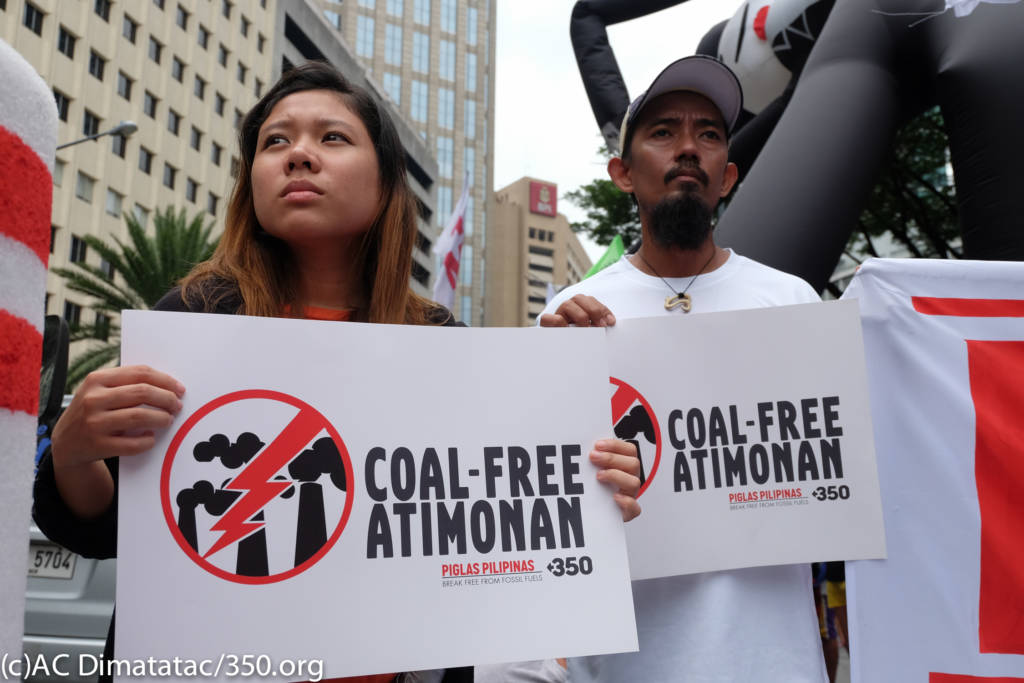By Piglas Pilipinas
Climate justice activists, composed of civil society groups and people’s organizations, held a concerted action today at the Bank of the Philippine Islands (BPI) Ayala Triangle to protest the Ayala-controlled bank’s planned financing of a new coal-fired power plant in Atimonan, Quezon. The said bank – housed by the Philippine Stock Exchange building where many other commercial banks are listed as coal project investors – was also slammed by climate justice activists for its continued financing of other coal projects.
The protesters brought tall, inflatable, “dirty, costly, and deadly coal demons”, which served as a backdrop to a huge image of Ayala Group CEO Jaime Zobel de Ayala, to highlight the temptations of an obsolete fossil fuel to private banks such as BPI.
The protest action is part of Piglas Pilipinas, a nationwide campaign for the Philippines to break free from fossil fuels. Its main call stressed on the importance and urgency of divesting from coal and other fossil fuels.

Climate justice activists and anti-coal communities held an action near the Head Office of the Bank of the Philippines Islands to protest the bank’s of coal-fired power plants as part of the Reclaim Power – Peoples’ Action on Energy and Climate actions that are happening in November. Photo: Ac Dimatatac
Coal: Not Clean, Not Cheap
“Coal is not the answer to our country’s energy needs,” said Philippine Movement for Climate Justice Coordinator Ian Rivera.
“Contrary to the coal industry’s persisting propaganda, coal is neither cheap nor clean. In fact, it has time and again been proven to be dirty, costly, and deadly,” said Rivera.
According to Rivera, coal is the culprit for the health problems suffered by communities that host coal-fired power plants. He cited a Harvard study conducted in the Philippines which found an annual estimate of 2,410 deaths as a consequence to exposure to pollution emitted by coal plants. Rivera stated that residents of communities that host these coal plants often suffer from lung, cardiovascular, and skin diseases. He also added that due to soil and water contamination from coal plant chemicals, the residents’ livelihood is often left destroyed.
“Coal is also deadly not just for local communities but for the rest of the world,” continued Rivera.
“The burning of fossil fuels, coal being the worst of them, is the lead contributor to carbon emissions that aggravate global warming, which we know to be the primary cause of stronger typhoons, longer droughts all over the planet, and other forms of ecological disasters,” he said.
“Coal is, most of all, expensive – with most of its costs externalized and paid for by society at large,” said Rivera, citing huge economic losses from the environmental, health and livelihood destruction caused by the extraction and utilization of coal for power generation, and the establishment and maintenance of coal facilities.
Rivera stated that the coal industry is now being outstripped by new technologies that make cheaper solar and wind power, citing a renewable energy sector that continues to drive down its prices.
“Clean and sustainable energy sources are steadily making the continued usage of coal not only an obsolete choice, but also an inexpedient one,” said Rivera.
Reputational Risks and Stranded Assets
“Investors and depositors of BPI should be advised against coal financing for its reputational risks. Most alarming of all, however, are the investment risks that continued coal financing poses. As our country, along with the rest of the world, moves towards renewable energy sources, coal assets will be nothing more than stranded assets in the future,” warned Rivera.
According to research conducted by the climate justice activists, BPI is invested in presently operating coal plants, such as the SEM Calaca in Batangas, Team Energy Pagbilao in Quezon, Cebu Energy Development Corporation and Toledo Power Corporation in Cebu, and GNPower Mariveles in Bataan.
The group of climate justice activists stated that BPI also has plans to invest in the coal pipeline, particularly in the Masinloc Expansion Project in Zambales, in the Pagbilao Energy Corporation in Quezon, the GNPower Dinginin in Bataan, and GNPower Kauswagan in Lanao del Norte.
Other coal-fired power plants have not disclosed their investors.
Reclaim Power 2017: Global Wave of Actions for Just Energy Transformation
The protest at the Makati central business district is part of the Reclaim Power Global Wave of Actions for a just energy transformation for the entire month of October.
“The science of climate change is unequivocal, it’s undeniable, and so now, action to transform our energy system is urgent and must be done immediately,” said Greenpeace Climate and Energy Campaigner Reuben Muni.
“The energy sector produces over 35% of all climate pollution caused by humans each year, mainly from the extraction and burning of fossil fuels like coal, oil and gas. According to the latest numbers from the UN, over 80% of all remaining fossil fuels like coal, oil and gas will have to remain unburned if the world is to avoid extremely dangerous climate change,” emphasized Muni.
“Reclaim Power is about demonstrating that while the current energy system fails on so many levels, including its failure to resolve the energy poverty of 1.2 billion people in the world who continue to have no access to any electricity, we have solutions using renewable energy technology that can decentralize power production and actually get it to all people in a democratic, people-controlled way,” explained Asian Peoples’ Movement of Debt and Development (APMDD) Coordinator Lidy Nacpil.
“We need to ensure community and public control of our energy systems, to ensure that people’s access is prioritized over profit,” concurred 350.org Digital Communications Campaigner and Coordinator Chuck Baclagon.
“The technology to provide energy to all of humanity without burning the planet already exists. Instead of continuously giving handouts to dirty energy companies, what we need now is to direct public – and private – finance and subsidies to encourage 100% renewable and clean energy,” Baclagon concluded
